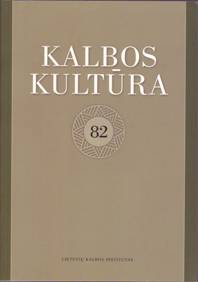Interneto komentuotojų nuostatos dėl lietuvių kalbos priežiūros
Attitudes of internet commentators towards the supervision of the Lithuanian language
Author(s): Rita MiliūnaitėSubject(s): Baltic Languages
Published by: Lietuvių Kalbos Institutas
Summary/Abstract: The paper deals with the attitudes of internet commentators towards the supervision of the Lithuanian language. Reference is made to a discussion launched on the internet in April 2009 on the initiative of the Commission of the State Lithuanian Language that the new draft law on the state Lithuanian language should include a provision that the language of the information placed on the internet and in public space in general should be in accordance with the requirements of standard Lithuanian.The researched commentaries have shown that people differ in their attitudes towards the importance of language supervision and control of different areas of language usage. Some claim that any intrusion into language is unacceptable; others admit that some areas of language usage should be controlled on a national level. The majority of commentary writers are not indifferent towards the processes going on in contemporary Lithuanian and current language policy; they also raise various issues on language supervision and expect that language supervision institutions should be more actively involved in the process.The commentaries usually refer to the following areas of language usage (official and free) which require supervision and control (given in the order of importance): 1) mass media (television and radio programmes, TV films, news portals on the web and the press); 2) public discourse of politicians (language of politicians and other representatives of public institutions); 3) public information and services (public notices, names of companies, company websites); 4) education (kindergartens and schools); 5) literature (especially translations); 6) private websites (e.g. blogs) and internet commentaries. The society most often relates its expectations of a well-formed and grammatically correct language with spoken, printed and internet mass media. Public information (public notices, names of companies) and the language of politicians are treated as requiring most control.The supervision of public speeches on the internet, not included in the Law on State Lithuanian Language of 1995, is treated in different ways. Many people approve of the idea that the language of news portals should be more strictly supervised. However, opinions differ as to the supervision of commentaries and particularly their regulation by fines. Some agree that stricter control should be imposed on the language of commentaries, especially on spelling and swear words; some authors treat such measures as an attack on human rights.Before taking measures of language policy and discussing them in public, it would be important to consider the variety of approaches and their arguments. This would help avoid misunderstandings and the tension arising between linguists and the society at large.
Journal: Bendrinė kalba (iki 2014 metų – Kalbos kultūra)
- Issue Year: 2009
- Issue No: 82
- Page Range: 149-172
- Page Count: 24
- Language: Lithuanian

